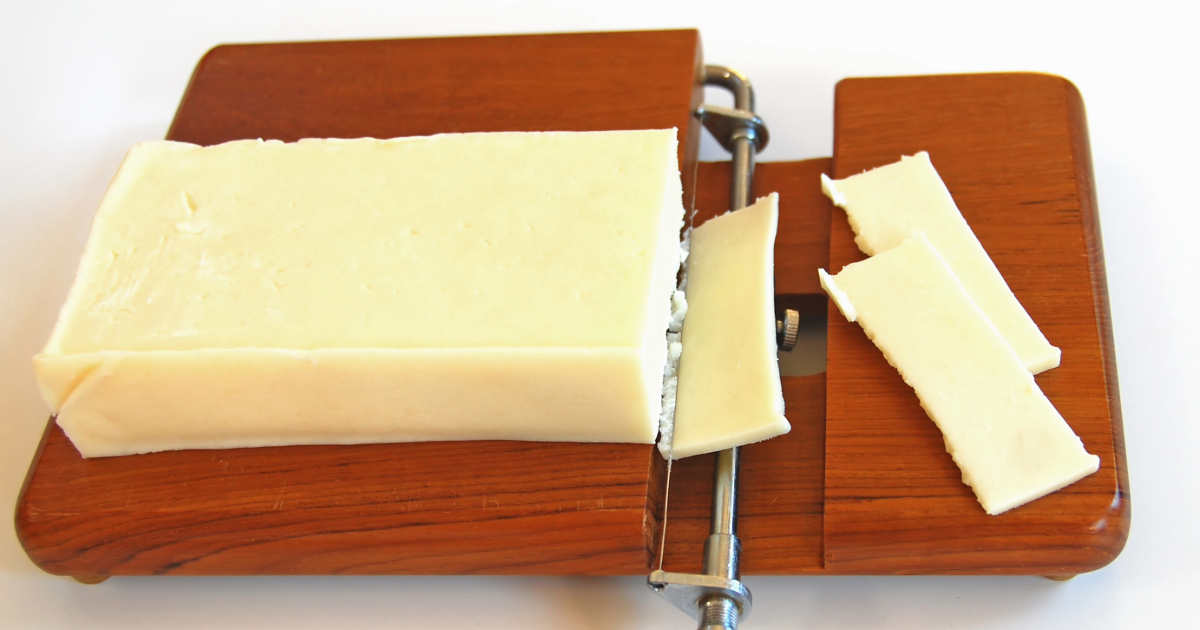Monterey Jack and Colby Jack are two popular semi-hard American cheeses.

They share some similarities but have key differences when it comes to their flavor, texture, appearance, ingredients, culinary uses, and nutritional value.
Origins and History
Monterey Jack cheese originated in the 18th century from Franciscan friars in Alta California, who made a semi-firm, creamy, mild cheese from cow's milk. In the 1880s, businessman David Jacks commercialized and popularized the cheese, originally called "Jacks Cheese," leading it to be known as Monterey Jack.
Meanwhile, Colby cheese was first made in 1885 by Joseph Steinwand in Colby, Wisconsin. He made a stirred-curd cheddar, but washed the curds with cold water to create a mellower, higher-moisture cheese. It was named after the nearby city of Colby where his family's cheese factory was located.
Key Takeaway: Monterey Jack dates back to 18th century Spanish missionaries in California, while Colby cheese was invented in the 1880s in Wisconsin.
Flavor and Texture
Monterey Jack has a very mild, slightly sweet, buttery flavor. It is a semi-hard cheese but generally softer and creamier than other cheeses like cheddar. The curds are smooth and it melts very easily.
Colby cheese also has a mild flavor, described as nutty or tangy. It has an open texture with irregular holes. The higher moisture content gives it a softer, springier texture compared to cheddar.
When blended together into Colby Jack, the flavor remains mild and lightly tangy, while the texture becomes even creamier. The cheese pulls apart in shreds when melted.
Key Takeaway: Monterey Jack is extremely mild tasting, while Colby has a subtle nutty tang. Combined in Colby Jack, they create a creamy, melty cheese.
Appearance
Monterey Jack has a pale white color and smooth, waxy rind. Colby is colored a medium yellow with annatto vegetable dye and also has a waxy rind.
Colby Jack is a marbled cheese with an orange and white pattern created by blending the Colby and Jack curds together before pressing the cheese. This distinct marbled coloration makes Colby Jack easily recognizable.
Ingredients and Make Procedure
The main ingredients for both Monterey Jack and Colby are just cow's milk, rennet, starter cultures, and salt.
| Ingredient | Monterey Jack | Colby |
|---|---|---|
| Milk | Cow's | Cow's |
| Rennet | ✓ | ✓ |
| Starter | ✓ | ✓ |
| Salt | ✓ | ✓ |
| Annatto dye | ✓ |
They are made using a fairly similar process. The main distinction is that the Colby curds are washed with cold water after cooking, which removes some lactose and acid, resulting in a milder flavor.
Culinary Uses
Monterey Jack is extremely versatile:
- Melts beautifully, making it perfect for quesadillas, cheeseburgers, grilled cheese, etc.
- Delicious snacking cheese for cheeseboards due to its mild flavor
- Commonly used as a base for other flavored cheeses like pepper jack
- Works well in Mexican dishes, pasta bakes, casseroles and more
Colby also melts very well and can be substituted for Monterey Jack in any recipe calling for melted cheese. Its subtle tanginess gives it a bit more presence.
Colby Jack combines the best properties of both cheeses. Its creamy texture and mellow flavor make it a crowd-pleasing choice for apps, sandwiches, scrambles, mac and cheese, and more cheesy dishes.
Nutrition
Monterey Jack and Colby have very similar nutritional values. Both are high in calcium, protein, Vitamin A, and Vitamin B12. However, Colby Jack typically contains slightly more calories and fat since it is a whole milk cheese blended from two cheeses.
Per 1 oz serving:
| Nutrient | Monterey Jack | Colby Jack |
|---|---|---|
| Calories | 98 | 110 |
| Fat | 7g | 9g |
| Protein | 7g | 7g |
| Calcium | 20% DV | 20% DV |
| Vitamin A | 15% DV | 15% DV |
| Vitamin B12 | 15% DV | 20% DV |
So Colby Jack provides extra richness, while Monterey Jack is a slimmer option. Nevertheless, all are nutritious cheeses when enjoyed in moderation.
Popular Brands
Some well-known brands for Monterey Jack include Sargento, Tillamook, Cabot, Rumiano, and Kraft. Colby Jack is sold from the same major brands as well as others like Tilamook County Creamery, Crystal Farms, and Widmer's Cheese.
No matter your preference between Monterey Jack vs Colby Jack, you can easily find quality pre-shredded, sliced, or block options from major grocery stores and cheesemakers.
Key Takeaway: Both cheeses are widely produced by major dairy brands, so high quality Monterey Jack and Colby Jack are readily available.
FAQs
What's the difference between Monterey Jack and regular Jack cheese?
There is no difference. Monterey Jack and Jack cheese are the same thing. The full name is used to distinguish it from pepper jack and other Jack varieties.
Is Colby or Monterey Jack better for melting?
Both Monterey Jack and Colby melt extremely well. In fact, their excellent melting ability is one of the reasons they are often blended together into Colby Jack. So there is no substantial difference between Colby vs. Monterey Jack when it comes to melting quality.
Can I substitute Monterey Jack for Colby or vice versa?
Absolutely! Monterey Jack and Colby can be used interchangeably in any recipe without sacrificing taste or texture. Since they are quite similar mild-flavored cheeses, substitution works perfectly fine.
What’s a good cheese to mix with Monterey Jack?
Monterey Jack is very mellow, making it a perfect base for mixing with bolder cheeses. A few excellent choices are sharp cheddar, Parmesan, Gruyère, Gouda, and blue cheese. Mix up chunks or shreds for a custom blend.
Is Colby Jack the same as CoJack?
Colby Jack and CoJack refer to the same cheese product - a blend of colby and Monterey Jack cheese curds. The names are interchangeable when seeing them on cheese labels.
Conclusion
While Monterey Jack and Colby are distinct cheeses in their own right, both contribute important qualities when blended to make the popular Colby Jack cheese.
Monterey Jack adds its meltability and mildness, while Colby lends its subtle nutty flavor and yellow-orange hue.
Their similarities in flavor, texture, and cooking properties allow the two cheeses to substitute for one another seamlessly. Yet Colby Jack demonstrates why combining the two can create an even more useful, flavorful ingredient for any cheesy recipe.

